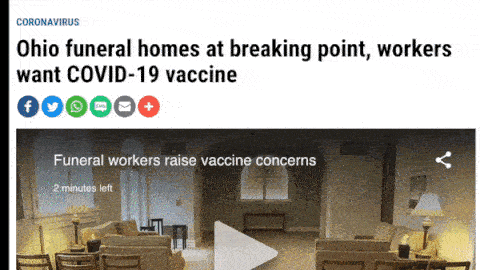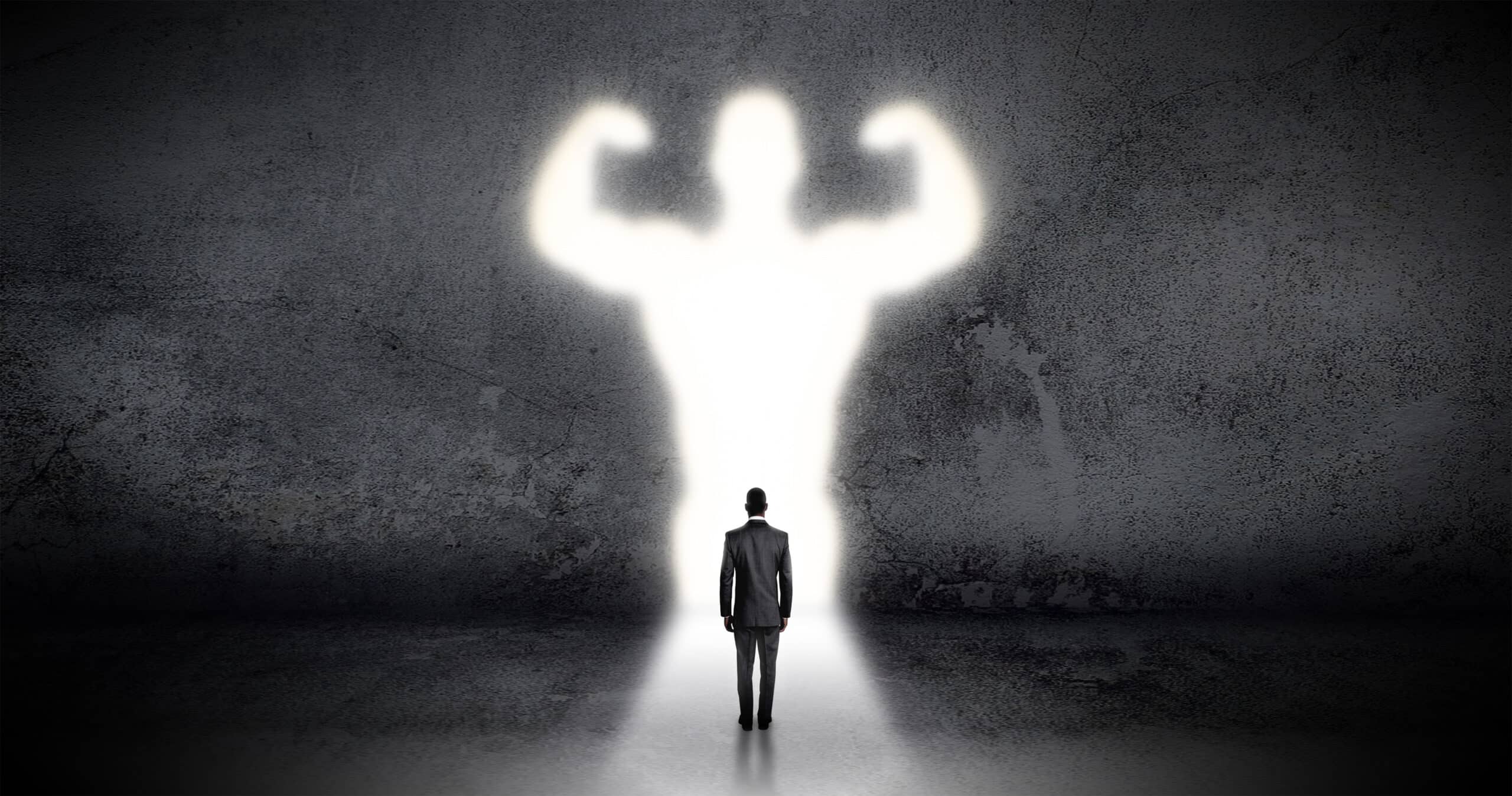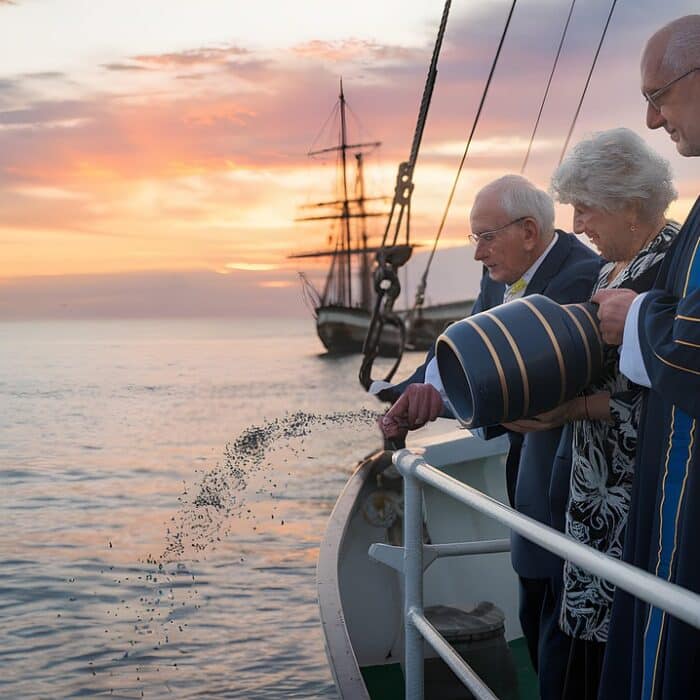Nov 04, 2021

A funeral director is one of the most unacknowledged and overlooked professions, and one of the most valuable assets in our society. This indisputable fact was proven time and time again over the course of the pandemic. Yet, the tireless efforts of funeral professionals were often overshadowed or ignored entirely by both our media and government. All of this occurred during a time when it was never more apparent just how essential and critical deathcare workers are to maintaining order during a mass casualty event.
How do we contend with this cultural amnesia? How do we reconcile with the fact that the vast majority of people fail to consider the essential role of a funeral director during a major crisis involving loss of life? And, most importantly, how to do we ensure in the future funeral professionals receive priority access to the same lifesaving resources that other emergency responders receive?

The pandemic is not the only occasion where mortuary professionals were left out of the conversation. When a major crisis or disaster occurs, they are often the lowest rung on the ladder. If it were only recognition and accolades that were at stake most funeral professionals would simply shrug and look at this as business as usual. However, during this coronavirus pandemic many funeral professionals were not given access to necessary personal protection equipment (PPE), could not receive priority vaccine distribution or were cut off from other vital resources. Sadly, some funeral professionals lost their lives due to this tragic failure of the system.
In the aftermath of this pandemic, many funeral professionals are left feeling jaded and rightly so. This has even driven some to leave the profession entirely, leading to concerns about a funeral worker labor shortage in some areas of the country. It is heartbreaking to think about funeral directors abandoning the call to serve because they put their lives at risk repeatedly without proper support or acknowledgement.

We believe funeral directors are truly the unsung heroes of this crisis. In our effort to shine a light on those who are often in the background, we put together a list of 5 different examples of when funeral directors went unnoticed during the pandemic.
1. PPE Access
“I think that society forgets that when we’re dealing with a virus, that virus is still alive when the person dies. So, we still have to make sure we’re protected so we don’t get the disease,” said Carol Williams, the executive director of the National Funeral Directors and Morticians Association and director of Carl M. Williams Funeral Home in Atlanta, GA. “We’ve had members pass away because they didn’t have proper PPE. We just ordered 100 body bags three weeks ago and it’s back ordered because we aren’t first responders.”
The biggest and most glaring example of funeral directors being discounted is the travesty that occurred with PPE. Imagine a person sick with COVID is admitted to a medical facility. Literally every single person who interacts with that patient will be wearing head to toe PPE. Then, when the patient sadly passes away and it’s time for the funeral home staff to come into that facility and remove the body, he or she is expected to complete that task without the same protection. By what logic does that make sense? For the funeral directors who were put in this position, they were constantly made to feel as though their health and safety were somehow more expendable than healthcare workers.
“We have a great deal of respect for healthcare but as the deaths are our industry, we are dealing with the same particular person with the same virus. We have family. We have to go to work and we want to be treated as essential workers,” said Georgia Funeral Director, Darrell Watkins, in an interview with a local news channel.
In addition, while hospitals and nursing homes did not allow the families of COVID patients to physically enter their premises, funeral directors often had no choice but to interact face to face with the family members of COVID victims.
“We had to make removals from homes, hospitals, near family members who have it, or have arrangements with family members who have it in our funeral home. Potentially infecting our entire staff. Or the funeral services.” shared Michigan Funeral Director, Nikita Terasova on ASD’s social media. “We didn’t know who had or who didn’t, but we still held services for those families that wanted them…Delivering death certificates, urns, paperwork, to homes so people didn’t have to leave, even though the decedent died in that home. Sure, the families don’t risk going out, but we risked going IN to that house every day.”

There is no question that PPE shortages impacted all essential workers, but so many funeral directors shared how they could not even place an order for PPE because they weren’t considered in the same category as others. Others saw PPE they had successfully ordered being rerouted to medical facilities. Funeral home employees absolutely have every right to demand the same safety standards as their first responder counterparts. The failure of health and government agencies to properly classify funeral directors in the same category as medical workers was truly an egregious mistake that cost lives.
“I’m not trying to downplay any other groups who need PPE because so many do. But very often so much attention is paid to the very legitimate need of the first responder that the last responder is ignored. Oftentimes, the funeral directors are an after-thought,” said Dan Otto, Executive Director of the Missouri Funeral Directors and Embalmers Association in an interview with a local news channel.
2. Vaccine Distribution
By the time states began distributing vaccines to essential workers last winter, a precedent had already been set for funeral directors not being considered priority recipients. Many associations took proactive steps to ensure deathcare workers were prioritized in the vaccine roll out. However, despite their best efforts, in at least five states it did not matter as government officials rebuffed their requests or gave false assurances that were later contradicted by other agencies.

Let’s begin with Massachusetts where funeral directors were listed behind non-COVID-facing health officials like podiatrists and acupuncturists in the vaccine distribution order. Even after a group of 100 lawmakers submitted a request to the governor’s office to reconsider the category assigned to deathcare workers, they were met with silence for more than two weeks, leading some funeral home workers in the state to feel so dejected and undervalued that they questioned if their state government was actually prejudiced against them.
“We are a profession whose licensure and existence is based on our role in public health. Most of us consider this work to be a very sacred duty, to be charged with care of a loved one, and we aren’t going to stop, but it is frustrating that the state isn’t valuing our work and recognizing the risk we put ourselves into,” said Funeral Director C.R. Lyons in an article for the Salem News. Lyons is also the President of the Massachusetts Funeral Director Association. “I can’t help but think there’s a bias toward end-of-life care somewhere in the administration.”
Funeral directors in Ohio were equally frustrated with their state officials’ reluctance to add them to the vaccination distribution list. In a letter sent to the governor’s office, the Ohio Funeral Directors Association urged the governor’s office to reconsider their decision: “While funeral directors do comply with CDC guidelines and state orders, the potential for being a hub for the spread of this virus is genuinely concerning…we strongly urge the Governor to correct this oversight as soon as possible and amend Phase 1B to include funeral directors, embalmers, and their staff for immediate vaccine distribution,” the letter stated.

In Georgia, funeral home employees were listed in category 1B, behind other emergency responders like police officers and fire department officials. In Wisconsin, deathcare workers were initially not listed in the first phase of the vaccine rollout until a group of funeral directors presented their case to local and state officials. They accomplished their mission, but were unable to get their support staff vaccinated, despite the fact that many of those individuals came into close contact with COVID victims and their families.
“In Michigan, we had to lobby to be categorized as a healthcare professional, so that we could be in the very first wave of vaccines. We succeeded….and then we weren’t allowed to start getting the vaccine until the third or fourth wave of vaccines,” shared Michigan Funeral Director, Niketa Terresova.
3. Frontline Hero Recognition Initiatives
When it was announced the city of New York would be holding a parade to honor the essential workers of the pandemic last summer, many funeral professionals were disheartened to notice their profession was not among the groups singled out for recognition. This, in a city that saw deathcare workers standing in line in the rain for hours waiting to remove bodies from trailers, sleeping in their cars so they could serve as many families as they possibly could, and driving for many hours outside of the state to find a crematory that did not have an enormous backlog.
“I haven’t heard the same recognition from the city that everyone from food delivery men to UPS and FedEx delivery men have gotten. The same kinds of accolades and credits they’ve received—which they deserve—I have not heard the same about the funeral industry,” said John Heyer Jr., of Scotto and Heyer Funeral Directors in an article for the Gothamist. “As funeral directors, we were in every single hospital that had high incidents, with bodies, with families, and many of us have lost staff and family members because we kept doing our essential work.”

It wasn’t just New York City that forgot to thank and acknowledge the essential role of funeral directors during the pandemic. During a time when deathcare workers were under enormous stress, with many suffering from Post-traumatic stress disorder (PTSD) or fearing the loss of their own life, they were forced to watch every other COVID-facing occupation receive messages of support. While billboards and yard signs helped many essential workers to feel appreciated, funeral directors were more often than not, left out. They were constantly reminded how invisible they were to others.
“The fact that no one even acknowledged us, took its toll on me mentally. While first responders were being praised every day for their hard work, last responders aren’t even thought of, let alone thanked,” shared Terresova. “Before COVID happened, the thanks from a grateful family was all I ever needed, but after being forgotten, ignored and taken advantage of, in tandem with watching ALL other essential workers getting SOMETHING for their hard work, I am left feeling jaded.”

The biggest issue we take with funeral directors being left out of these frontline hero parades and tributes is they contribute to our society’s overall ignorance surrounding the important work of funeral directors. The old adage out of sight, out of mind certainly seems to apply here and it has real-world consequences on the mental health of deathcare workers. The experience of having to go into a crowded trailer filled with bodies to locate a deceased person, of having to carry out your job duties while fearing for your own health, of having to break the news to families that they cannot memorialize their loved one in the manner they want to…it is enormously difficult for funeral directors to reconcile with such memories. What they have endured is truly unimaginable and yet they never stopped working despite being exposed to these harrowing conditions day after day. To not be recognized for this crucial work makes funeral directors feel as though the trauma they experienced does not matter, which in turn amplifies it exponentially.
“So many of us in the funeral industry have gone through a truly traumatic experience dealing with the number of deaths, the fact that we all had to leave our families and then jeopardize them when we came back home, to take care of people passing away,” Heyer said. “Too often you only hear about funeral homes and directors when something goes wrong and there’s a problem—when someone has done something really horrible. You don’t often hear and acknowledge the services they’re providing the rest of the time.”
4. Discounts and Freebies
“While my funeral home was overwhelmed and overworked and under an immense amount of stress daily in Detroit, an epicenter for the disease, we watch as healthcare workers get free stuff from restaurants, discounts on merchandise from stores, billboards with words of thanks, and lawn signs for support,” shared Terresova.“We weren’t even acknowledged a 10th of what other people were.”
In addition to the visual reminders of appreciation frontline workers received, many stores and businesses offered gifts, discounts and other exclusive promotions exclusively to those individuals. While those who implemented these initiatives certainly had good intentions, to acknowledge some COVID-facing occupations and not others has resulted in many funeral professionals feeling slighted. It’s not about a free coffee or a discounted pair of sneakers—it’s about being seen and celebrated for the tremendous sacrifices you are making to help others. Like other emergency responders, deathcare workers should be recognized for their bravery.
NY Funeral Directors, Alexandra K Mosca and Doris Amen call out the makeup brand Sephora for not including funeral professionals in their discount program.
5. Disaster Preparation Planning
When you look at what happened in New York City in spring 2020, it is clear what occurred was truly unimaginable for everyone. Pointing fingers and assigning blame for a situation no one believed was possible does serve any meaningful purpose. Hindsight will always be 20/20. That said, the capacity issues and delays that occurred at funeral homes, cemeteries and crematories in the city could have been greatly alleviated by more responsive emergency planning measurements.
We can’t help but think that giving deathcare professionals a seat at the table during those discussions might have helped to streamline some of the emergency orders that needed to be passed in response to the crisis. There were a lot of questions that could have been answered in advance. Involving funeral directors in the creation and implementation of policies that directly impact their work, especially in regard to emergency response situations, should be the gold standard going forward.

“More research is needed to understand the role death management plays in our emergency planning,” wrote Staci M. Zavattaro, a professor of public administration at the University of Central Florida, in a recent article for the Orlando Sentinel.“Including deathcare professionals in emergency planning could go a long way to better understand those professionals, what they do and how they do it. Learning from their experiences during COVID-19 will be critical to creating best practices that balance efficiency for the agencies with effectiveness for families.”
The Champions of the Funeral Profession
It is important to note that the National Funeral Directors Association (NFDA), International Cemetery, Cremation and Funeral Association (ICCFA) as well as many state and local funeral associations did lobby for and advocate on behalf of funeral directors from the very early days of the pandemic. Whether they were putting pressure on lawmakers to classify funeral directors as critical workers, coordinating volunteer efforts in COVID hotspots or interviewing with media representatives to try to bring attention to the challenges funeral directors were faced with, these hardworking individuals should absolutely be commended for their work during the pandemic. We have seen firsthand funeral home association leaders going to bat for deathcare workers over the past two years, proving there is no shortage of champions within our own profession. They are also unsung heroes who should be recognized for everything they have done to support funeral professionals.
Final Thoughts
The pandemic has given us many lessons we have had to learn the hard way. Funeral professionals have always known that they live and work in a death-denying culture. However, it took a mass casualty event to demonstrate how this reality directly impacts their lives. It is hard to come to grips with the fact that so many people in our society are willing to shun deathcare workers in their efforts to shut out the reality of death. But funeral directors don’t serve the dead, they serve the living. Their work is absolutely crucial to helping so many families cope with the loss of a loved one, and never in recent history have so many people needed them at the same time.
We feel compelled to bring attention to all of the ways funeral directors were ignored and disregarded during the pandemic because it is our sincere wish that such an awful oversight will never occur again. There is no way to change the events of the past two years. However, it is paramount that future history books record the courage, compassion and resolve deathcare workers demonstrated during our nation’s greatest hour of need. The children of funeral directors need to know their parents are heroes who ran into the storm while others retreated. When our society looks back on this devastating pandemic in the years to come, we pray the brave and honorable work of the deathcare community is never again forgotten.

Related Reading
8 Funeral Directors Who Have Helped Shed Light on the Tragic Toll of the Pandemic
8 Times We Were Moved by Funeral Services During the Pandemic
16 Character Traits That Define Funeral Service Professionals
About The Author
Jess Farren (Fowler)
Jess Farren (Fowler) is a Public Relations Specialist and Staff Writer who has been a part of the ASD team since 2003. Jess manages ASD’s company blog and has been published in several funeral trade magazines. She has written articles on a variety of subjects including communication, business planning, technology, marketing and funeral trends. You can contact Jess directly at Jess@myASD.com




